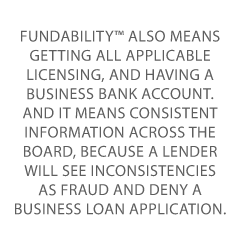So, What is Business Credit?
Business credit is credit in the name of a company and not its ownership. When considering what is business credit, it can help to remember that it’s different from personal credit.
What is My Business Credit Score?
It’s the question on every entrepreneur’s mind. What is my business credit score?
Most people are familiar with how a personal credit card works. You start with no credit profile. Then you get small credit cards to initially build your business credit score. And then as your credit grows, you can use it to qualify for loans, business financing for autos, even mortgages.
With business credit you can do the exact same thing.
A business itself can also start with nothing. And then put small credit accounts on the report called “vendor” accounts to establish a business credit score. Then you can use that credit to qualify for loans, auto vehicle financing, and even mortgages.
Business credit is extremely versatile.
What is business credit? It’s a means to qualify for financing.
Who Needs Business Credit?
Virtually any business needs business credit, and that includes startups and even nonprofit organizations. But why?
Business credit works well for businesses because it allows a small business owner to put off payments on a credit card (often for 30 days). This can be helpful when inflation is rising quickly.
It also works to demonstrate responsibility on the part of a company. When looking to borrow money, or even to sell the business, good business credit is a positive.
Good small business credit can even help lower your business insurance premiums. It’s a green flag to potential business partners as well.
What is business credit? It’s an asset.
Small Business Credit Advantages
Having small business credit provides any entrepreneur some major advantages. For one, by building business credit and personal credit, the entrepreneur has double the borrowing power as the owner now has two profiles they can use to obtain credit.
When small business credit is built the right way, you can build it with no personal credit check or guarantee. This makes it perfect for credit challenged individuals, and those who want to eliminate their personal liability on their business debts.
It is also a business asset. And, yes, you can include it in the purchase price if you ever sell your business.
But you may be wondering – just what is my business credit score? All too many business owners get into serious trouble. Or they lose their personal assets, even file personal bankruptcies. And they do this all to get rid of business debt.
With business credit this doesn’t need to happen.
Unlike personal credit, the entrepreneur isn’t liable for the business debts. Instead, only the business is.
That means in case of default, the lender couldn’t pursue the personal assets of the business owner.
What is business credit? It’s a way to protect your personal assets.
The Business Credit Bureaus
There are several business credit bureaus, but the three biggest are where you should spend time and energy.
These business credit bureaus are:
- Dun & Bradstreet
- Experian (also personal credit)
- Equifax (also personal credit)
D&B is considerably larger than the other two combined. You must proactively get a DUNS number. But when you do, that, plus three credit reporting experiences to D&B gets your business a PAYDEX score.
Many small business lenders and credit issuers want to see a PAYDEX of 80 or better (the scale goes up to 100). Paying bills on time, particularly your company’s biggest bills, is how you get an 80 PAYDEX.
The next two are also consumer credit bureaus.
Experian gets some of your small business credit score from your personal credit score. Hence, your personal finance can reflect on your business credit report from them—good or bad.
With Equifax (and the others), paying bills on time is key for getting good business credit scores. You can start generating a business credit score by using a small business credit card for vendor credit which reports.
It pays to get your small business credit report from each bureau to check for errors. However, it’s not like personal credit, where you get a free personal credit report once per year.
What is business credit? It’s information on Dun & Bradstreet, Equifax, and Experian’s radar.
What Does The Small Business Administration Say?
The SBA states that business credit approvals are typically 10-100 times higher than consumer credit approvals. So another benefit of business credit is the business can get a lot more money in approvals.
And, business credit can be built quickly. So, this is much faster than personal credit. It is very practical for a business to qualify for credit within 90 days or less.
And then build that credit to a point where the business is getting $10,000 credit card approvals within 6 months or less.
Business credit is one of the strongest assets any business can have.
So ask yourself: what is my business credit score?
What is business credit? It’s a positive recognized by the SBA.
How to Establish Business Credit
Establishing business credit is a process. It does not happen automatically. Following these steps gets your business to a good business credit score quickly.
Step 1: Set Up Your Business for Fundability™
A Fundable business is set up professionally. It addresses any concerns a lender may have when you try to get a business loan or business line of credit.
Having Fundability means your business name does not reflect a high risk industry. There is nothing underhanded about leaving your industry out of your business name.
It also means incorporating your business, to make it a separate entity. If it’s not a separate entity, it cannot have its own business credit scores.
This means having a DUNS number and an EIN from the IRS. It also means your business has a brick and mortar address where mail can be delivered—not just a post office or UPS box.
It means your business has a good online presence, with your own website and email on the same domain as your site.
It means a separate phone number for your business, too. And it means your business phone number has a listing on 411.
Fundability™ also means getting all applicable licensing, and having a business bank account. And it means consistent information across the board, because a lender will see inconsistencies as fraud and deny a business loan application.
Personal credit and personal financials are a part of Fundability, too. Good personal credit and professionally prepared personal financial documents will go a long way.
Step 2: Establish and Build Vendor Credit
Vendor credit (also called trade credit) is generally a business credit card you can get which has what are called net terms. For a net 30, for example, you have 30 days from the date of purchase to pay.
If you can pay on time, you avoid paying interest and get a good business credit score. If you’re using a business card with no annual fee, that means you’re paying virtually nothing for the privilege of holding onto your money a little bit longer.
Vendor credit is easy to get. For account opening, you often don’t need business credit payment history, although you may need to provide a personal guarantee or secure the account with a deposit. The best business credit card is one you can get.
Buy what you need with vendor credit. This can be everything from janitorial products to gas to marketing services. Always pay back on time.
What is business credit? It’s a way to run your day to day operations.
Step 3: Continue with Retail and Fleet Credit
As you progress, you start qualifying for a better class of business credit card. Retail credit comes from stores. Fleet credit cards are good for fueling, maintaining, and repairing company vehicles.
Many of these cards may require more time in business and good credit history. Hence, they are recommended after you’ve been using vendor credit cards for at least a good six months.
As you pay these cards on time, start asking for credit limit increases. You should also be doing this with any vendor credit card by this time.
Businesses with a good credit history of paying on time should be able to get limit increases with ease.
What is business credit? It’s a way to get high limit credit cards.
Step 4: Get a Business Credit Card
A business credit card is a more universal type of business card. They can be Visa, MasterCard, Discover, American Express, and the like.
Some may have annual fees—and those annual fees can start to get steep. You will likely have to prove a longer time in business. And you may need to be able to prove a certain level of incoming cash flow. You probably need good credit history.
Monthly profits may have to be in the tens of thousands or more.
Being able to demonstrate you already have a credit card with high limits will help with getting approvals.
What is business credit? It’s a way to get more financing approvals.
Step 5: Monitor Your Credit
Errors can creep into any business credit report and drag business credit scores down. You can fix them, but you will never know about these mistakes unless you monitor your credit.
It can get expensive to buy monitoring from a big three business credit bureau. Fortunately, Credit Suite offers monitoring of all three for 90% less than it costs a la carte.
Types of Business Credit
What is business credit? It’s a few types of credit for businesses. While there is some crossover between types, you can divide business credit into:
- Vendor credit
- Store credit
- Fleet credit
- Service credit
- Business credit cards
Vendor Credit
What is business credit from a vendor? Vendor credit is credit which a starter vendor extends to a business. Often, requirements are less stringent than for other types of credit. This makes vendor credit (AKA trade credit) a perfect fit for startups.
With no (or a short) time in business requirement, vendor credit is a proven workaround.
Starter credit vendors often sell things you buy all the time, like electronics, cleaning supplies, and even PPE. Since you’ll have this business expense anyway, why not build business credit while you’re at it?
Store Credit (AKA retail credit)
What is business credit from a retailer? Potentially requiring some time in business—and maybe a minimum amount of provable profit—retail credit is a way to buy from some of the most extensive retailers out there.
Unlike most vendor credit, a retail credit card might have revolving terms. Revolving terms are what we normally think for credit cards—a set amount of time to pay and, if you are late, you pay some form of interest.
With this type of credit, the interest rate should be of concern to an entrepreneur when they are deciding whether to sign up.
Retail credit, because it comes from bigger providers, has even more of what you need to run your business.
Ask for credit limit increases after a few months of paying bills on time. Prove you are responsible and pay the bills to maximize your chances of success. This will also help you get a small business loan later.
Fleet Credit
Fleet credit is for buying fuel, and servicing and repairing company vehicles. You do not need to have a substantial fleet to enjoy the benefits of fleet credit.
These are nearly always gas cards.
However, one prudent use of business credit is to buy vehicles with vehicle financing and then fuel and repair them with fleet credit. On-time payments on both kinds of debt will help the other.
Service Credit
Much rarer than the other kinds of credit, service credit is a business credit card for services. As with all other sorts of credit, terms and rates for service credit will vary.
A Business Credit Card
While we may use the term ‘business credit card’ to mean any sort of card, the term truly applies just to more universal types of credit cards.
That is, cards like Discover, American Express, MasterCard, and Visa. Terms are virtually always going to be revolving. And credit limits are often higher.
If you have been consistently asking for limit increases on other credit cards for your business, then there is precedent for a card issuer to grant you high limits.
For a business credit card, you often need to show a longer time in business. You may need to show a certain amount of revenue per month or per year.
And, you may have to produce business financial statements, or verify your business has a particular minimum number of employees.

